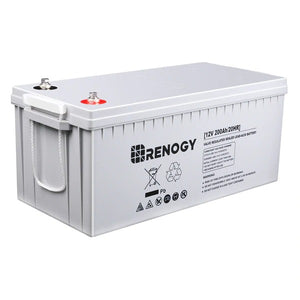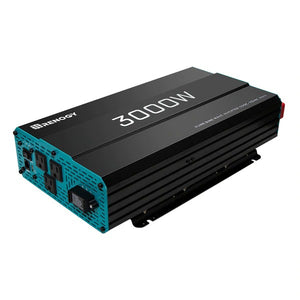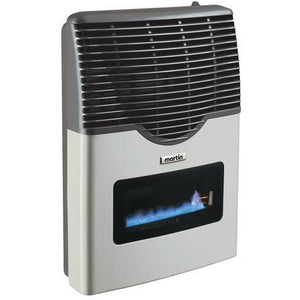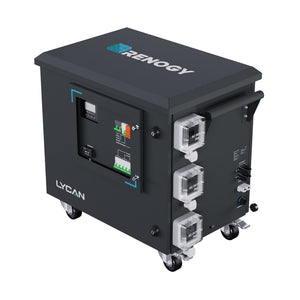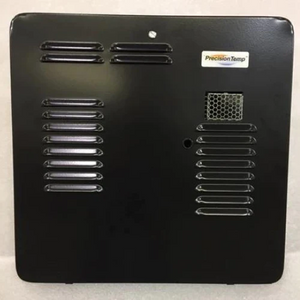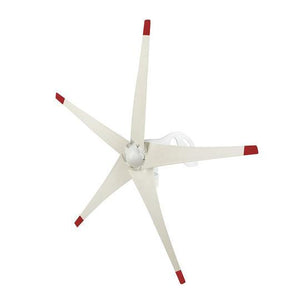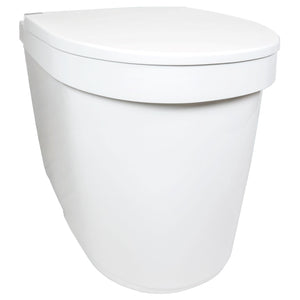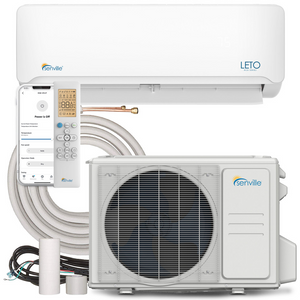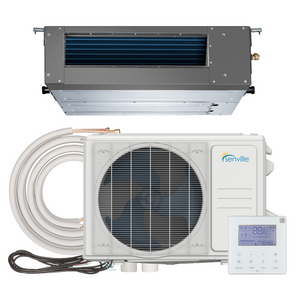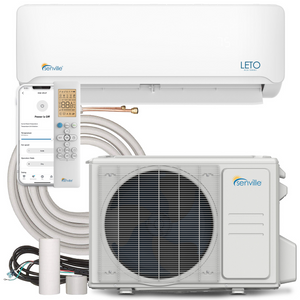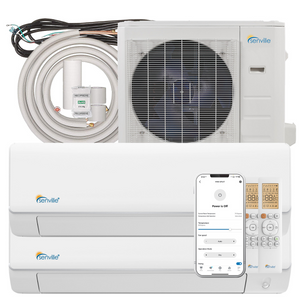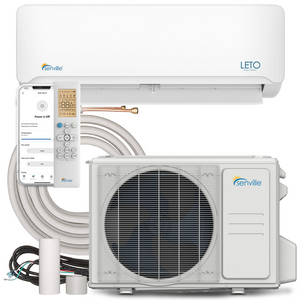Living off the grid in your tiny home requires a reliable and efficient energy storage solution. Deep cycle batteries play a crucial role in storing solar power for use when the sun isn't shining. In this shopping guide, we will explore and compare four popular battery brands: Aims Power, Renogy, Fullriver, and Expion 360 VPR. By understanding their features, specifications, and performance, you'll be able to make an informed decision and select the right deep cycle battery for your off-grid lifestyle.
Aims Power Batteries:
-
Features: Aims Power batteries are known for their high-capacity and deep cycle capabilities, making them ideal for off-grid applications. They offer a range of battery options to suit different energy needs.
-
Specifications: Aims Power batteries come in various voltages and capacities, allowing you to choose the one that best matches your power requirements.
-
Performance: Customers praise Aims Power batteries for their durability, long lifespan, and ability to withstand deep discharges. They are known to deliver consistent and reliable power.
Renogy Solar Batteries:
-
Features: Renogy is a reputable brand in the solar industry, and their deep cycle batteries are designed to provide reliable energy storage for off-grid systems. Renogy batteries are known for their high-quality construction and efficient performance.
-
Specifications: Renogy offers a range of battery options, including lithium iron phosphate (LiFePO4) batteries known for their superior energy density, long cycle life, and lightweight design.
-
Performance: Renogy batteries are highly regarded for their excellent performance in terms of charging efficiency, low self-discharge rates, and the ability to handle high currents. They are also known for their advanced Battery Management System (BMS) technology, ensuring optimal battery health and safety.
Fullriver Batteries:
-
Features: Fullriver batteries are renowned for their deep cycling capabilities and exceptional reliability. They are designed to withstand frequent and deep discharges, making them suitable for off-grid living.
-
Specifications: Fullriver offers a wide range of deep cycle batteries, including AGM (Absorbent Glass Mat) and gel batteries, known for their maintenance-free operation and resistance to vibration.
-
Performance: Fullriver batteries are praised for their robust construction, long service life, and superior performance in demanding off-grid applications. They provide consistent power output and are resistant to shocks and vibrations, making them suitable for mobile tiny homes.
Expion 360 VPR Batteries:
-
Features: Expion 360 VPR batteries are specifically engineered for deep cycle applications and are highly regarded for their reliability and performance. They are designed to deliver consistent power for extended periods.
-
Specifications: Expion 360 VPR batteries come in various capacities and are known for their high energy density and long cycle life. They are built with advanced valve-regulated technology, ensuring maintenance-free operation.
-
Performance: Expion 360 VPR batteries are recognized for their excellent deep cycling capabilities, fast recharge rates, and minimal self-discharge. They are known to provide a reliable and continuous power supply for off-grid systems.
When choosing a deep cycle battery for your off-grid tiny home, it's important to consider factors such as capacity, performance, durability, and compatibility with your solar system. Aims Power, Renogy, Fullriver, and Expion 360 VPR are reputable battery brands that offer reliable options for off-grid living. Evaluate your energy needs, budget, and specific requirements to make an informed decision. Remember, investing in a high-quality deep cycle battery is essential for ensuring a consistent and sustainable power supply in your tiny home.
Selecting the Best Batteries for Your Off-Grid Solar System:
Choosing the perfect batteries for your off-grid solar system holds immense significance as different types of deep cycle batteries exhibit varying degrees of energy efficiency, cost-effectiveness, and storage capacities. It is vital to consider multiple factors when selecting an appropriate solar battery, encompassing aspects such as battery lifespan, ease of installation, cost-effectiveness, and storage space utilization. Here, we provide valuable guidance to help you ascertain the most suitable battery for your solar panel system, empowering you to achieve optimal energy storage and utilization.
When it comes to solar installations, deep cycle batteries are highly recommended for efficient energy storage. A wide array of deep cycle batteries exists in the market, offering diverse options to cater to specific needs. These options include lead acid batteries, sealed lead acid batteries, AGM batteries, gel batteries, and lithium LiFePO4 batteries. In this comprehensive guide, we delve into the various deep cycle battery types available for solar installations, helping you make an informed decision for optimal energy storage and utilization.
Lead acid batteries:
-
Lead acid batteries, commonly referred to as wet cell batteries, offer an affordable option readily available at major retail stores and auto shops. These batteries come with several benefits, including a relatively low upfront cost, enhanced safety features, and a commendable level of reliability. However, it is important to weigh these advantages against the maintenance requirements associated with lead acid batteries. They necessitate a well-ventilated environment, are susceptible to corrosion, and must be positioned upright to prevent leakage. Additionally, it's worth noting that lead acid batteries tend to be bulky, heavy, and require substantial space allocation.
AGM Batteries:
-
AGM, short for Absorbent Glass Mat, represents an advanced and non-hazardous variant of lead acid batteries. Distinguished by their unique design where the electrolytes are absorbed into a glass mat, AGM batteries offer a multitude of advantages. With lower internal resistance and enhanced temperature tolerance, AGM batteries outperform traditional lead acid batteries. Notably, AGM batteries provide efficient energy storage capabilities, boasting a 10 to 15 percent higher energy capacity compared to standard lead acid batteries, all while charging up to four times faster. Furthermore, AGM batteries feature versatile plate options, available in flat or spiral-wound configurations.
Gel Batteries:
-
Gel batteries harness the power of fumed silica to create a thickened electrolyte, offering an array of exceptional benefits. With its unique composition, the gel electrolyte ensures the utmost sturdiness, preventing any leakage even in the face of battery damage. Remarkably low-maintenance, gel batteries exhibit unparalleled resistance to shock and vibration. They thrive in extreme temperature conditions, making them an ideal choice for both scorching heat and freezing cold. Moreover, gel batteries showcase outstanding life cycles, delivering prolonged and reliable performance. However, it is crucial to consider their narrow charging profiles, as improper charging or overcharging may potentially damage the batteries.
Lithium LiFePO4 batteries:
-
Lithium LiFePO4 batteries stand as the epitome of efficiency, boasting exceptional longevity and unrivaled safety features. These cutting-edge batteries demand minimal maintenance, requiring no attention for at least 15 years following installation. Outlasting traditional lead-acid batteries by a staggering fourfold, lithium LiFePO4 batteries offer significantly reduced weight for enhanced portability. However, it's important to acknowledge that opting for lithium LiFePO4 batteries entails a higher upfront investment, as they can cost up to four times more than alternative solar battery options.
Understanding Charging Times for a 12V 100AH Battery with Your Solar Kit:
When determining how long it takes to charge your 12V 100AH battery using a solar kit, several factors come into play, including sunlight, temperature, and the characteristics of the battery itself. To get a rough estimate, you can calculate the amps delivered by your solar panels by dividing the total wattage by the battery's voltage. Next, divide the amp hours of your battery by the amps delivered to estimate the charging duration. For instance, if you have a 100AH 12V battery connected to three 100-watt solar panels, your system would deliver 25 amps. Dividing 100AH by 25 amps reveals that a 300-watt solar panel system can charge a 12V 100AH battery in approximately four hours.
Can You Wire Different Battery Types and Sizes Together in Your Solar System?
One common question that arises during solar system setups is whether it is feasible to wire together batteries of varying types and sizes. While it may seem convenient to mix and match, experts generally recommend wiring batteries that share the same type and amp hour rating. This means that if you choose AGM batteries for your solar installation, it is advisable to ensure that all batteries in your battery bank are AGM batteries. By adhering to this practice, you can minimize any potential efficiency loss associated with using different battery types. In this comprehensive article, we delve into the implications of combining different battery types and sizes in your solar system, emphasizing the significance of maintaining uniformity to achieve optimal performance.
Key Factors to Consider When Choosing a Battery for Your Solar Kit:
Selecting the right battery for your solar kit requires careful consideration of multiple factors that directly impact performance and longevity. This detailed guide sheds light on essential aspects, including battery capacity, charging time, budget, lifespan, and warranty. By thoroughly evaluating these factors, you can make an informed decision and choose a solar battery that optimally meets your energy storage requirements. Delve into this comprehensive article to discover the critical factors and make a confident selection for your solar kit battery.
Battery Capacity: Ensure Ample Energy Storage
-
Determining the battery's capacity, measured in Amp-Hours (Ah), is crucial when evaluating solar batteries. Capacity denotes the amount of energy a battery can store under specific conditions. Consider your energy needs and choose a battery with an appropriate capacity. A higher capacity allows for longer usage, while a lower capacity with a high power rating can support your home for a shorter duration. Remember, higher capacity and power rating lead to better performance.
Charging Time: Optimize Efficiency
-
Efficient charging is vital for maintaining the effectiveness of your off-grid solar system. Lithium-ion and gel batteries are excellent choices as they offer rapid charging capabilities. In contrast, lead acid batteries may require almost an entire day to reach full charge. Consider the charging time of different battery options to ensure an efficient and convenient energy storage solution.
Budget: Balancing Cost and Performance
-
While considering your budget, it's crucial to find the best value for your investment. As the adage goes, "You get what you pay for." Generally, higher-priced solar batteries deliver superior performance and longer lifespans. Lithium-ion batteries, despite being more expensive than AGM or lead acid batteries, offer advantages such as low maintenance, resilience, easy installation, and overall superior performance in various aspects. Assess your budget and make an informed decision based on long-term benefits.
Lifespan: Longevity Matters
-
The lifespan of a battery is a significant consideration, as it directly impacts its performance over time. With each passing day, batteries lose their ability to hold a charge effectively. Factors such as battery type, size, and brand influence the overall lifespan. To ensure longevity, be prepared to invest more in a battery that guarantees extended performance. Pay attention to the ratings provided on the packaging to gain insight into the lifespan of the battery you intend to purchase.










